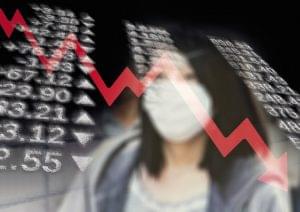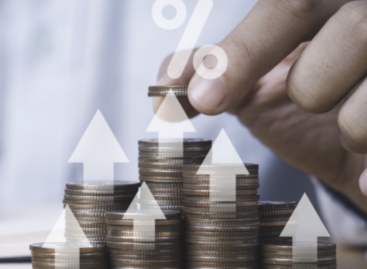Magazine: Coronavirus: A threat to the world economy
When the COVID-19 pandemic started in China, nobody thought that in just a few weeks the virus will appear in other parts of the globe too. As the coronavirus disease was spreading all over the world, the probability of an economic recession increased. In the beginning, the main economic problem was the disruptions in the supply chains and the fact that many Chinese companies that were exporting products to every part of the world stopped production. By now so many people have caught the virus in various countries that the everyday operation of the economy has become difficult. According to an early March report by the Organisation for Economic Cooperation and Development (OECD), the 2.4-percent economic growth forecasted for this year is the lowest since 2009, and it is now likely to reduce to 1.5 percent if the pandemic can’t be stopped in Asia, Europe and North America.

What is the situation in China? About 90 percent of the companies in China (approximately 50,000 firms) are located in the regions hit by the coronavirus. Due to the COVID-19 pandemic, China’s export plunged by 17.2 percent in the first two months of the year. An analysis by ABN-AMRO says: if the spending of Chinese consumers is in stagnation, it has an impact on other economies too, because there is a smaller demand for their products, and because there is a downturn in tourism. Chinese tourists represent 9 percent of global tourism and the country contributes about 16 percent of the world’s GDP – their impact on the world economy is very big.
At the moment it seems that the situation can take a turn for the worse any time. McKinsey published an analysis on 9 March, which envisages three scenarios. According to the first one, the pandemic will end soon as the virus is seasonal. The second scenario is there will be a global economic slowdown, as the countries won’t be able to stop the pandemic. In Europe and the USA, many people will catch the disease, but only in certain regions. People will change their lifestyles drastically and the global GDP growth will drop to 1-1.5 percent – but there will be no economic recession. Sectors in services will suffer the most, in the field of consumer goods there will be a downturn in demand until May-June only. As for the third scenario, it predicts a worldwide pandemic and a global recession. This scenario claims that the virus isn’t seasonal, more and more people will catch the disease and it will put a great burden on the healthcare systems of countries. The world economy will fall into a recession, and global economic growth will be between 0.5 and 1.5 percent.

The coronavirus outbreak put many companies in a difficult situation, as the pandemic has a great influence on the working of those supply chains that start in China or go through it. It will take months until the effects of the recent positive developments in China (companies are slowly staring production in the former epicentre of the pandemic) can be felt in other parts of the world. When Chinese factories started closing because of the coronavirus disease, production stopped in other parts of the world as factories weren’t supplied the parts and materials to work with. Plus Chinese consumers have great purchasing power too, and if they stop buying, it entails a big reduction in revenues for the international companies that are present in China. In the first quarter of 2020 the Chinese economy slows down to 4.5 percent.

So far COVID-19 has hit Italy the hardest in Europe, and the country’s shaken economy has a negative effect on the Eurozone, where Italy is the fourth biggest economy. The coronavirus pandemic broke out in the region which serves as the engine of the Italian economy: Lombardy contributes 22 percent of Italy’s GDP. The Italian economy can calculate with a minimum 3-percent deficit.

For instance, Germany’s annual export to Italy represents a value of EUR 60 billion. Plus the German economy also heavily relies on the parts and materials sourced from China. In Germany, it is the automotive industry that faces the biggest problems due to the COVID-19 pandemic, as sales plunged by 92 percent in this sector. The country’s GDP growth is forecasted to rise by only 0.8 percent.

Two scenarios are likely for the United States of America. No.1 is that the pandemic comes and goes, and calculating with a 10-percent drop for a 3-month period would mean a 0.7-percent decrease in the GDP. Then in May-June, the US economy will recover and people start spending again. Scenario No.2 says the virus won’t disappear, but it will continue spreading and the US economy will go into recession for quite a while. Many people will be laid off and this will entail a reduction in consumer spending. An analysis by JPMorgan even claims that both the USA and Europe will be in a state of economic recession by July. At the moment it seems that the coronavirus has a much bigger impact on the economy than anyone would have thought. When the present issue of our magazine went to press, all countries have taken the necessary strict measures, and scientists are doing their best to find a cure for the disease. Blood from cured coronavirus patients can be of great help in developing a vaccine. We must remain hopeful!
After our magazine went to press, you can catch up with the latest news at www.trademagazin.hu or by subscribing to our daily newsletter at info@trademagazin.hu. Both our newsletter and our website feature the digital version of Trade magazin – with extra content!
//
Related news
ESG – about sustainability standards, from a legal perspective
Since December 2023 several pieces of legislation have been published…
Read more >Can the lending boom continue next year?
The volume of retail loan agreements this year could even…
Read more >Shoppers are prepared to look for the best deals – EY Christmas survey
The majority of shoppers are specifically looking for and waiting…
Read more >Related news
Recognition of Consumer Protection Excellence: Honoring the Best of 2024
This year’s outstanding consumer protection officers and special award recipients…
Read more >The Joy of Giving! – SPAR stores collect non-perishable food for people in need
The Hungarian Maltese Charity Service and SPAR Hungary have launched…
Read more >KSH: industrial production decreased by 0.2 percent in October
In October, the volume of industrial production fell by 0.2…
Read more >








